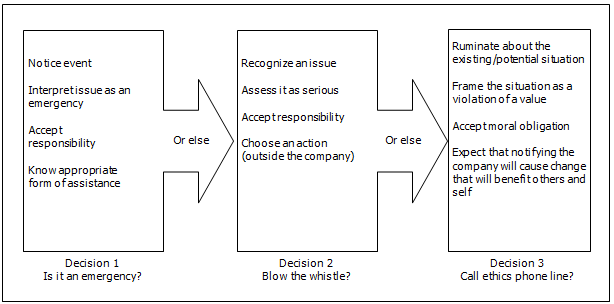Table of Contents
Carl R. Oliver (oliveca@earthlink.net) is Senior Lecturer at Loyola Marymount University in Los Angeles, and co-author of Business Ethics: The Path to Certainty, from which some of this article was adapted.
For every company, “tattling syndrome” is a fundamental problem. Cultural norms that discourage tattling plague corporate ethics programs and degrade their effectiveness. Employees resist speaking up when they see ethics problems. They grew up in a culture that influences them to turn a blind eye to coworkers' wrongdoing, to decide not to get involved, to speak no ill of anyone, to never spread gossip, and to not be informers or snitches.
Companies want their cultural norm to be: Speak up! Do not tolerate even the smallest ethics problem. The de facto minimum standards for company ethics programs are set by the U.S. Sentencing Guidelines for Organizations.[1] To meet those standards, companies need to detect, investigate, and fix ethics and compliance problems at the earliest possible time. So, they need employees to quickly report trouble indicators while the problems are small and relatively easy to fix, before they fester into ethics catastrophes.
To borrow a currently popular phrase, companies need to tell employees, “If you see something, say something.”
Companies provide reporting channels (e.g., ethics telephone hotlines/helplines, online messaging, and other methods) that employees or anyone can use to report ethics concerns; and they promise safety, saying no one who reports an issue in good faith need fear they will be punished or become victims of retaliation.
Fear of punishment or retaliation may be common obstacles to reporting, but another is simply that people learn not to tattle as they are growing up. They develop tattling syndrome.
What can a company do to make “see something, say something” happen?
The ethics reporting process
A qualitative study of calls made to the ethics telephone lines of three companies over a two-year period shows people follow a process when deciding whether to raise an ethics question or express an ethics concern.[2]
The study indicates people are inherently reluctant to call an ethics telephone line and must cross a psychological threshold before they will do so. That threshold has two components:
-
Cognitive – They must know the phone number, and
-
Affective – They must feel a concern deeply, think about it repeatedly, feel anxious about it, perhaps feel worry or anger or lose sleep over it. They ruminate about it.
To eliminate any cognitive block, companies widely advertise their ethics telephone number and website.
To eliminate any affective block, companies train employees on corporate values,[3] frame the ethics hotline/helpline and online messages as helpful channels or as avenues for prosocial action, assure employees that their reports are wanted and will be acted upon fairly, and promise callers their identity will be protected to the extent possible if they request it.
Callers cross the reporting threshold at various values. Some indicate the threshold for calling to report wrongdoing by a co-worker felt higher than the threshold for calling to ask for expert help on how company ethics policies apply to a decision they are about to make.

Observation indicates employees typically consider these decision-tree factors before calling the ethics telephone line.
Figure 1 shows an exclusionary process people follow before they reach the threshold to call the ethics hotline/helpline.
Decision 1 is whether the issue is an “emergency” requiring their action. Most issues are not. Professors Bibb Latané and John Darley[4] determined that people use four steps to make this decision:
-
Notice an event
-
Interpret it as an emergency
-
Accept responsibility
-
Know an appropriate form of assistance
Because the ethics phone line is not a 9-1-1 line, people who decide that an issue is an emergency are instead likely to call the police, fire department, or corporate security.
If people decide an issue is not an emergency requiring their action, Decision 2 is whether it is an issue requiring “whistleblowing,” which is defined as an alert to “authorities” outside the company. Again, most issues are not. Building on the Latané and Darley research, professors Marcia Miceli and Janet Near[5] determined that people use four steps to make that decision:
-
Recognize an issue
-
Assess it as serious
-
Accept responsibility
-
Choose an action
People deciding that an issue requires whistleblowing are likely to call law enforcement, journalists, or lawyers.
If people decide whistleblowing is not required (at the moment), Decision 3 is whether the issue requires an ethics hotline/helpline call inside the company. Review of the content of ethics phone calls suggests callers use four steps to make that decision:
-
They ruminate about what is or could become a bad situation;
-
They create a mental frame explaining that the situation has been or would be created by someone violating a value (usually the value that people should be treated honestly, fairly, and openly) and thus cause social damage, although this may be hard to prove;
-
They feel a moral responsibility to somehow confront the issue; and
-
They expect an ethics hotline/helpline call to result in the company solving the problem to benefit other people and themselves.
Overall, the study indicates that occasionally someone will call the ethics phone line for a less-than-noble or even a mean-spirited purpose, but employees generally call because they want to help their company, not hurt it. They want to help make their company a great place to work and sustain its reputation for high ethics.
Psychology author Nick Dubin points out that the difference between undesirable tattling and desirable peer intervention is this: Tattling aims to get someone in trouble, but peer intervention aims to protect people or the company.[6]
